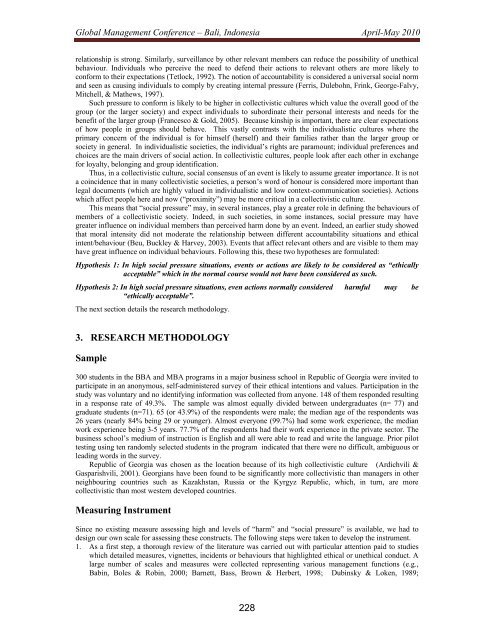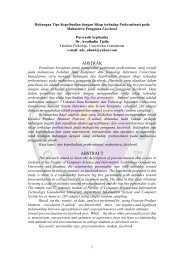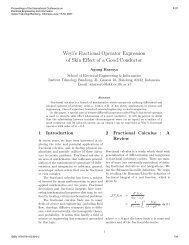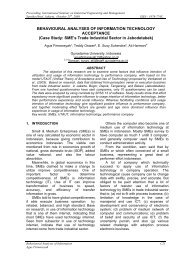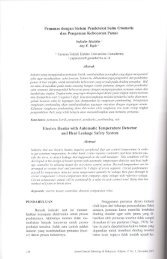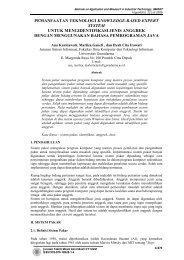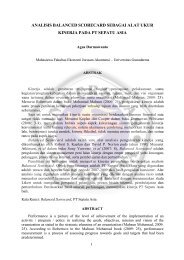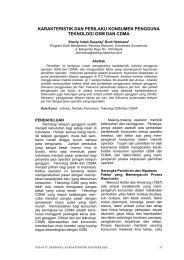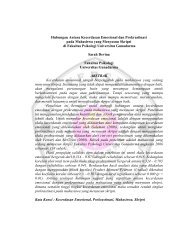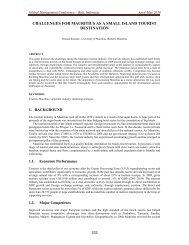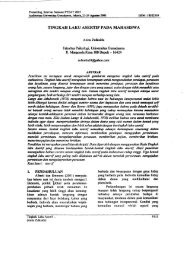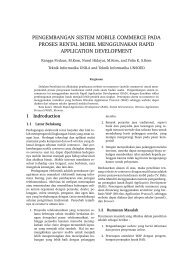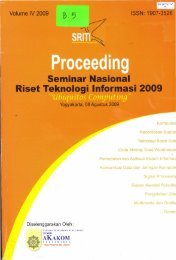does social pressure influence ethical perceptions? - Repository ...
does social pressure influence ethical perceptions? - Repository ...
does social pressure influence ethical perceptions? - Repository ...
You also want an ePaper? Increase the reach of your titles
YUMPU automatically turns print PDFs into web optimized ePapers that Google loves.
Global Management Conference – Bali, Indonesia April-May 2010<br />
relationship is strong. Similarly, surveillance by other relevant members can reduce the possibility of un<strong>ethical</strong><br />
behaviour. Individuals who perceive the need to defend their actions to relevant others are more likely to<br />
conform to their expectations (Tetlock, 1992). The notion of accountability is considered a universal <strong>social</strong> norm<br />
and seen as causing individuals to comply by creating internal <strong>pressure</strong> (Ferris, Dulebohn, Frink, George-Falvy,<br />
Mitchell, & Mathews, 1997).<br />
Such <strong>pressure</strong> to conform is likely to be higher in collectivistic cultures which value the overall good of the<br />
group (or the larger society) and expect individuals to subordinate their personal interests and needs for the<br />
benefit of the larger group (Francesco & Gold, 2005). Because kinship is important, there are clear expectations<br />
of how people in groups should behave. This vastly contrasts with the individualistic cultures where the<br />
primary concern of the individual is for himself (herself) and their families rather than the larger group or<br />
society in general. In individualistic societies, the individual’s rights are paramount; individual preferences and<br />
choices are the main drivers of <strong>social</strong> action. In collectivistic cultures, people look after each other in exchange<br />
for loyalty, belonging and group identification.<br />
Thus, in a collectivistic culture, <strong>social</strong> consensus of an event is likely to assume greater importance. It is not<br />
a coincidence that in many collectivistic societies, a person’s word of honour is considered more important than<br />
legal documents (which are highly valued in individualistic and low context-communication societies). Actions<br />
which affect people here and now (“proximity”) may be more critical in a collectivistic culture.<br />
This means that “<strong>social</strong> <strong>pressure</strong>” may, in several instances, play a greater role in defining the behaviours of<br />
members of a collectivistic society. Indeed, in such societies, in some instances, <strong>social</strong> <strong>pressure</strong> may have<br />
greater <strong>influence</strong> on individual members than perceived harm done by an event. Indeed, an earlier study showed<br />
that moral intensity did not moderate the relationship between different accountability situations and <strong>ethical</strong><br />
intent/behaviour (Beu, Buckley & Harvey, 2003). Events that affect relevant others and are visible to them may<br />
have great <strong>influence</strong> on individual behaviours. Following this, these two hypotheses are formulated:<br />
Hypothesis 1: In high <strong>social</strong> <strong>pressure</strong> situations, events or actions are likely to be considered as “<strong>ethical</strong>ly<br />
acceptable” which in the normal course would not have been considered as such.<br />
Hypothesis 2: In high <strong>social</strong> <strong>pressure</strong> situations, even actions normally considered harmful may be<br />
“<strong>ethical</strong>ly acceptable”.<br />
The next section details the research methodology.<br />
3. RESEARCH METHODOLOGY<br />
Sample<br />
300 students in the BBA and MBA programs in a major business school in Republic of Georgia were invited to<br />
participate in an anonymous, self-administered survey of their <strong>ethical</strong> intentions and values. Participation in the<br />
study was voluntary and no identifying information was collected from anyone. 148 of them responded resulting<br />
in a response rate of 49.3%. The sample was almost equally divided between undergraduates (n= 77) and<br />
graduate students (n=71). 65 (or 43.9%) of the respondents were male; the median age of the respondents was<br />
26 years (nearly 84% being 29 or younger). Almost everyone (99.7%) had some work experience, the median<br />
work experience being 3-5 years. 77.7% of the respondents had their work experience in the private sector. The<br />
business school’s medium of instruction is English and all were able to read and write the language. Prior pilot<br />
testing using ten randomly selected students in the program indicated that there were no difficult, ambiguous or<br />
leading words in the survey.<br />
Republic of Georgia was chosen as the location because of its high collectivistic culture (Ardichvili &<br />
Gasparishvili, 2001). Georgians have been found to be significantly more collectivistic than managers in other<br />
neighbouring countries such as Kazakhstan, Russia or the Kyrgyz Republic, which, in turn, are more<br />
collectivistic than most western developed countries.<br />
Measuring Instrument<br />
Since no existing measure assessing high and levels of “harm” and “<strong>social</strong> <strong>pressure</strong>” is available, we had to<br />
design our own scale for assessing these constructs. The following steps were taken to develop the instrument.<br />
1. As a first step, a thorough review of the literature was carried out with particular attention paid to studies<br />
which detailed measures, vignettes, incidents or behaviours that highlighted <strong>ethical</strong> or un<strong>ethical</strong> conduct. A<br />
large number of scales and measures were collected representing various management functions (e.g.,<br />
Babin, Boles & Robin, 2000; Barnett, Bass, Brown & Herbert, 1998; Dubinsky & Loken, 1989;<br />
228


